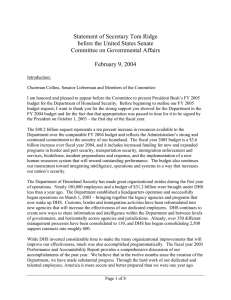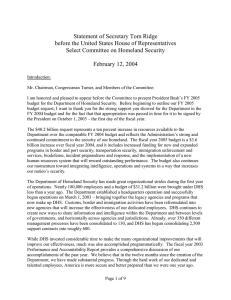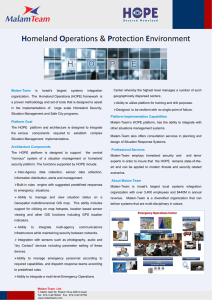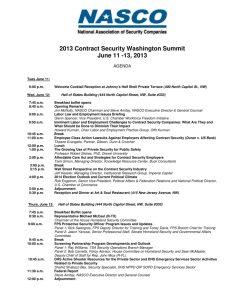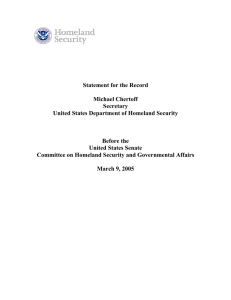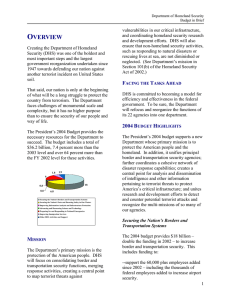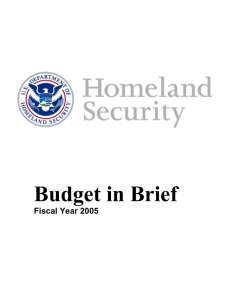Encouraging Students Toward STEM and IT Careers
advertisement
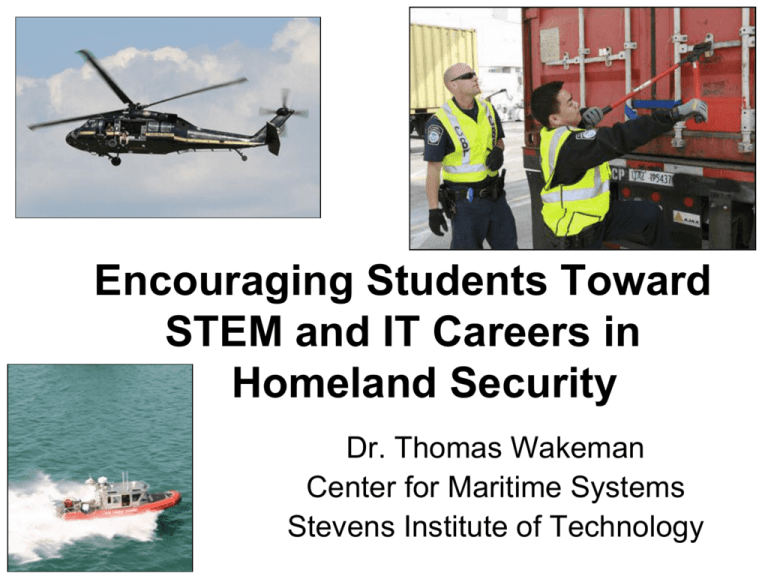
Encouraging Students Toward STEM and IT Careers in Homeland Security Dr. Thomas Wakeman Center for Maritime Systems Stevens Institute of Technology Homeland Security Jobs… Recession Proof? Presentation Outline • Description of the homeland security field. • U.S. DHS and other types of fields this area of study prepares students to enter. • Profile of students enrolled in security technologies and resiliency studies. • Job prospects and salary information for graduates in this field. • PLUS Educational Opportunities – DHS National Center of Excellence for “Port Security” Careers in Homeland Security • The field of Homeland Security has many unique career opportunities that will challenge the mind and reward professional skills and talents. • As a Homeland Security employee, individuals help secure our borders, airports, seaports and waterways; research and develop the latest security technologies; respond to natural disasters or terrorists assaults; and analyze intelligence reports and respond to emergencies. Major Career Areas • • • • • • • First Responders Law Enforcement Intelligence Community Operations Staff Planners and Analysts Scientist and Engineers Cyber Security An Overview Of the U.S. Administration U.S. Department of Homeland Security and Associated Agencies Security Legislation • USA PATRIOT Act – Passed in October 2001 – Reauthorized in March 2006 – Wide ranging act designed to expand authority of law enforcement agencies and officials in fighting terrorism • Homeland Security Act – Passed in November 2002 – Created the Department of Homeland Security Transportation Security Legislation • Aviation and Transportation Security Act – Passed in November 2001 – Created Transportation Security Administration – Required federal passenger screeners and screening of baggage for explosives • Maritime Transportation Security Act – Passed in November 2002 – Port security regulations for access control, background checks, vessel and facility security plans and performance standards for seals Transportation Security Legislation • Intelligence Reform and Terrorism Prevention Act of 2004 – Allows nation’s intelligence organizations to become more unified and coordinated – Title IV addresses transportation security – Title V deals with border protection, immigration, and visa matters – Title VI concerns the implementation of the 9/11 Commission’s recommendations Department of Homeland Security • Created in 2003 to consolidate Federal transportation security-related policy making and implementation activities. • Five Directorates – Border and Transportation Security – Emergency Preparedness and Response – Science and Technology – Information Analysis and Infrastructure Protection – Management DHS Vision & Mission • Vision Preserving our freedoms, protecting America ... we secure our homeland. • Mission We will lead the unified national effort to secure America. We will prevent and deter terrorist attacks and protect against and respond to threats and hazards to the nation. We will ensure safe and secure borders, welcome lawful immigrants and visitors, and promote the freeflow of commerce. DHS Strategic Goals • Awareness - Identify and understand threats, assess vulnerabilities, determine potential impacts and disseminate timely information to our homeland security partners and the American public. • Prevention - Detect, deter and mitigate threats to our homeland. • Protection - Safeguard our people and their freedoms, critical infrastructure, property and the economy of our Nation from acts of terrorism, natural disasters, or other emergencies. • Response - Lead, manage and coordinate the national response to acts of terrorism, natural disasters, or other emergencies. DHS Strategic Goals (cont.) • Recovery - Lead national, state, local and private sector efforts to restore services and rebuild communities after acts of terrorism, natural disasters, or other emergencies. • Service - Serve the public effectively by facilitating lawful trade, travel and immigration. • Organizational Excellence - Value our most important resource, our people. Create a culture that promotes a common identity, innovation, mutual respect, accountability and teamwork to achieve efficiencies, effectiveness, and operational synergies. Key Agencies & Roles • U.S. Coast Guard – One of nation’s five armed services – Formerly part of Department of Transportation – Responsible to protect public, environment and US economy in ports and waterways – Missions include maritime safety, protection of natural resources, mobility, maritime security, and national defense Key Agencies & Roles • U.S. Customs and Border Protection – Formerly US Customs Service – Responsible for conducting surveillance, detecting and interdicting smugglers, aliens, and collecting import/export duties on goods • Transportation Security Administration – Responsible for security in all modes and ensuring adequacy of security measures for transportation Associated Agencies • Federal – Department of Justice (FBI, DEA, Marshals) – Alcohol and Tobacco Tax and Trade Bureau (part of Department of Treasury) – Department of Transportation (new Federal Motor Carrier Safety Administration) • State – Law enforcement – Port Authorities and State DOTs Local/Focused Organizations • Local Agencies – Law enforcement and fire responders – Metropolitan Planning Organizations • Special Coalitions – Transportation-Focused Groups (I-95 CC) – Trade and Industry Groups (NYS Smart Border Coalition) – Private Sector Partnerships (Smart and Secure Tradelanes) U.S. DHS Career Areas • Prevention and Response • Immigration and Travel Security • Law Enforcement • Mission Support Prevention and Response Careers Prevention and response careers protect the public, environment and U.S. economic and security interests in any maritime region, as well as provide preparedness, protection, response, recovery and mitigation to reduce loss of life and property and protect the nation from all hazards are what these careers are all about. • Federal Emergency Management Agency • U.S. Coast Guard Law Enforcement Careers Law enforcement careers offer positions in protection of the President, Vice President, their families, heads of state and other designated individuals; securing the nation’s borders; interagency law enforcement training; and enforcing economic, transportation and infrastructure security. • • • • U.S. Customs and Border Protection Immigration and Customs Enforcement U.S. Secret Service Federal Law Enforcement Training Center Immigration and Travel Security Careers Immigration and travel security careers involve protecting the nation’s transportation systems, as well as overseeing lawful immigration to the United States. • Transportation Security Administration • U.S. Citizenship and Immigration Services Mission Support Careers Mission support careers involve the following fields: medical, human resources, facilities, budget, procurement, science and technology, training, intelligence, planning and coordination, detection, civil rights, fraud detection and more. • • • • • • • Science and Technology Directorate Domestic Nuclear Detection Office Executive Secretariat Military Advisor’s Office National Cybersecurity Center National Protection and Programs Directorate Office for Civil Rights and Civil Liberties Job Prospects Source: http://hubpages.com/hub/Hot-to-Find-a-Job-with-a-Degree-In-Criminal-Justice Salary Ranges (General vs STEM) GENERAL STEM • Transport Security $32,000 – 48,000 • Sec. Technician – $43,000 - 56,000 • Deportation Officer $49,000 – 61,000 • Admin. Specialist $47,000 – 67,000 • Import Specialist $51,000-80,000 • Naval Architect $44,000 - $116,000 • Criminal Investigation $89,000 – 116,000 • Program Analyst – $90,000 to 138,000 • Microbiologist $109,000 – 142,000 • Computer Engineer $124,000 – 156,000 http://www.dhs.gov/xabout/careers/ US DHS Career Website A report of the Homeland Security Research Corporation 2007-2011 forecasts that the U.S. Homeland Security markets, driven by the government and private sectors, will grow from about $24 Billion in 2006 to $35 Billion by 2011… a 45% increase!

